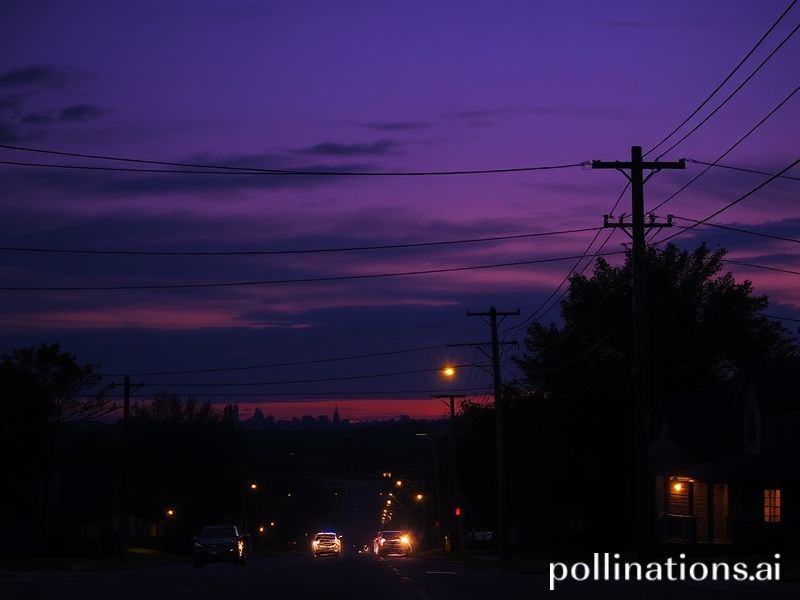When Dominion Flickers, the World Burns Candles: A Global Post-Mortem on Virginia’s Vanity Blackout
Lights Out in the Colonies: When Dominion Sneezes, the World Reaches for a Candle
By the time the outage map on Dominion Energy’s website froze—an irony not lost on anyone still clutching a 3-percent smartphone battery—the ripple had already crossed the Atlantic. Traders in London’s Canary Wharf learned that 44 % of Virginia’s grid had gone dark the same way they learn most things: a Slack ping followed by a 1 % spike in European natural-gas futures. Nothing says “developed economy” quite like watching a former empire hedge its afternoon Pimm’s against your inability to keep the lights on in Richmond.
From Berlin’s Tempelhof to Nairobi’s iHub, the commentary was as predictable as it was brutal. German engineers—who still remember when the Wall fell because the streetlights flickered—offered unsolicited advice about grid frequency inertia. Kenyan developers, accustomed to scheduled load-shedding that makes Dominion’s blackout look like a mild hiccup, posted memes of Americans discovering the Dark Ages in real time. Somewhere in a Seoul co-working space, a blockchain bro updated his deck: “Virginia blackout proves need for decentralized micro-grids. Seed round opening.” Even the Kremlin’s English-language channels got in on the act, pointing out that Crimea has had fewer unplanned outages per capita since 2014—an achievement surely worth annexing something over.
Of course, global schadenfreude only lasts until the supply chains cough. Taiwan Semiconductor, which produces roughly 92 % of the world’s advanced chips while the rest of us bicker on Twitter, noted that its new Virginia packaging plant was “assessing backup power scenarios.” Translation: if Dominion’s squirrels keep playing God with the substations, your next iPhone might arrive sometime after the heat death of the universe. Apple’s stock dipped 0.4 %, because nothing terrifies Wall Street like the prospect of Americans forming actual memories during a weekend without swipe-to-refresh dopamine.
Meanwhile, the United Nations Framework Convention on Climate Change issued a statement so bland it could have been generated by ChatGPT after three espressos: “Resilient infrastructure is critical to global decarbonization.” Roughly translated from diplo-speak: maybe stop building subdivisions where your grandparents once grew tobacco and start burying some damn power lines. The irony is exquisite—Dominion’s own glossy ESG report, released last quarter, promised “enhanced grid hardening.” Mother Nature, ever the satirist, appears to have opted for enhanced grid softening instead.
Human behavior under partial illumination is a study in primitive comedy. Virginians raided grocery stores for ice and non-perishables, apparently convinced that civilization ends where refrigeration begins. In Madrid, a radio host asked whether this was the same Virginia that once produced four of the first five U.S. presidents; the studio laughed so hard they cut to traffic. Back in Arlington, a neighbor with a $90,000 Rivian offered to “daisy-chain” his truck to the row houses—an act of generosity that also doubled as the most expensive extension cord in recorded history. The truck ran out of electrons at 2:14 a.m., just as the local foxes discovered that DoorDash had finally gone offline.
What does it all mean, beyond the obvious punch line that the world’s largest economy still can’t guarantee electricity when it drizzles? For one, the outage is a tidy parable of modern interdependence: a downed 500-kV line in Henrico County can goose aluminum prices in Shanghai and postpone a Zoom call in Zurich. More existentially, it’s a reminder that every technological civilization is always three hot meals away from barbarism, a fact we conveniently forget while doom-scrolling under LED bulbs. Dominion will file an incident report, regulators will hold hearings, and some poor vice-president will utter the phrase “once-in-a-generation storm,” blissfully unaware that the next generation is scheduled for next Tuesday.
By Wednesday the power was back, the memes had peaked, and the planet returned to its regularly scheduled emergencies. Still, somewhere a grid engineer in Lagos took notes: if America can’t keep its lights on, perhaps the future of reliable electricity lies somewhere south of the Potomac—and east of complacency. Until then, keep a candle handy; the next lesson in humility is only one squirrel away.







